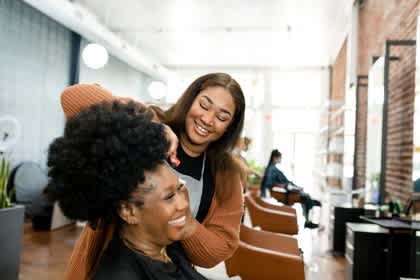5 Ways Community Can Uplift Black-Owned Businesses


Swyft Filings is committed to providing accurate, reliable information to help you make informed decisions for your business. That's why our content is written and edited by professional editors, writers, and subject matter experts. Learn more about how Swyft Filings works, our editorial team and standards, what our customers think of us, and more on our trust page.
Swyft Filings is committed to providing accurate, reliable information to help you make informed decisions for your business. That's why our content is written and edited by professional editors, writers, and subject matter experts. Learn more about how Swyft Filings works, our editorial team and standards, what our customers think of us, and more on our trust page.

Community is the heart and essence of every successful small business. When customers shop small through local businesses, they keep their dollars close to home by putting money directly into their neighborhood. And one of the most significant roles small businesses have is shaping a community’s identity, from interpersonal relationships to connections with the local government and economy. However, the benefits of small businesses aren’t felt equally by all business owners.
Since the onset of the COVID-19 pandemic, Black-owned small businesses face increasing challenges. During the pandemic, 92% of Black business owners reported experiencing financial hardship. Despite this large number, only 43% received the full amount of financial support they requested in small business loans through the Paycheck Protection Program (PPP).
As finances took a hit, many small businesses were forced to downsize temporarily or shut down for good. 2020 saw a 41% drop in the number of active Black business owners, and the pandemic only added fuel to the fire. Combined with overarching biases and an ongoing racial wealth gap, Black entrepreneurs are experiencing tough circumstances unique among other demographics.
It’s not a hopeless situation, however, and Black-owned businesses are on the rise. Despite the uphill battle created by the pandemic, Black entrepreneurs account for 26% of all new microbusinesses, up from 15% before the pandemic. Their comeback story still includes unfair challenges and roadblocks, but these businesses are still capable of making a mark in their communities.
Consumers are aware of the importance of small businesses thanks to the “shop small” movement. On the other side of the relationship, Black business owners can team up with fellow local Black entrepreneurs and make sure that a rising tide lifts all boats.
From formal partnerships to simple online shout-outs, here are five ways you can grow by using the power of community.
1. Take Advantage of Social Media
In today’s digital world, you shouldn’t overlook social media as a powerful tool for your business. Whether you create an account on popular platforms such as Facebook or Instagram, want a professional business image on LinkedIn or Yelp, or are diving into the hip trends on TikTok, every business can benefit from an active online presence.
But aside from the immediate business benefits of social media, such as increasing your market reach and connecting with potential customers, it also provides a unique opportunity to connect with the community.
Think of all the times you’ve opened Facebook and seen a post in which people from a community and beyond team up to help someone in need. This can range from a national movement such as Black Lives Matter to business owners seeking assistance in their hometown. These situations make social media’s power to forge deep connections clear.
If you’re looking to expand your business, boost sales, or increase your customer base, social media is a great place to start. And once you have a solid strategy and are engaging with your audience, you can take it a step further and connect with other Black-owned businesses in your community.
You’re likely already tuned in to local Black-owned businesses such as restaurants, boutiques, or even law firms. You can easily support and share Black voices within your community by visiting these businesses’ social media accounts and liking, commenting, or following them or by offering an online shout-out or two.
2. Foster Intentional Partnerships
Partnering with nearby Black entrepreneurs allows you to form connections in your community in ways similar to those found through the power of social media. Business partnerships provide an avenue for each business to get a helpful boost, but it’s also a great way to form a powerful network of supporters and create a new client base.
Your business could team up with other Black entrepreneurs in your community and collaborate on co-marketing efforts, create special discount offers, or form a shared list of Black vendors. For example, you can choose to use a Black-owned restaurant catering service for any business-wide meals or company events, or offer customers 20% off at checkout for another Black-owned business in the same niche.
It’s like the old saying goes, “teamwork makes the dream work.”
Finding common ground and ways to benefit each business is key to these business partnerships. Joining forces lets you work together to spread awareness and help both each other climb the ladder to success.
However, while these types of partnerships can be financially beneficial, it’s critical to also be authentic and transparent across the board. You don’t want to just jump in and hope for an instant sales boost. Create a meaningful relationship with your fellow business owner. In the end, the extra time and energy will result in a better partnership and campaign, but also a deeper, more meaningful connection.
Effective business partnerships take time, but a real and intentional connection with customers, vendors, and business partners can only help you further your audience reach and expand your business.
3. Team Up With Local Nonprofits
The core mission of many nonprofit organizations is helping enrich the lives of community members. So what better way to utilize the power of community than by teaming up with Black-led nonprofits in your own neighborhood?
Check out what local nonprofits or charities are active in your community and their mission statements or current goals. If there’s one that you connect with the most, reach out to see if they need help with any large-scale projects.
Teaming up with local nonprofits doesn’t only mean reaching out as a business owner to offer your time or resources. Instead, you can make it a company-wide initiative by promoting employee participation. By volunteering as a company, you can extend your hand in support of positive community change while also continuing to expand your reach and brand awareness.
If you’re unable to plan an in-person community event, you can always set up a donation drive for a nonprofit of your choice. Simply add a donation option for customers to opt-in during checkout, or set up an online donation drive on your website and social media accounts.
If you want to take it a step further, you can also reach out to national nonprofit organizations such as Black Girls Code, Black Women’s Blueprint, or Center for Black Equity. Although these national nonprofits and similar ones aren’t specific to your neighborhood, your participation can help support present and future Black entrepreneurs in America.
4. Invest in the Community

Even if you have limited resources, one of the easiest ways to connect with your community is to shop locally as a business. “Shop small” is a great rule of thumb for both direct consumers and business owners after all. Whether you’re purchasing items for your office, storefront, or your work from home space, you can actively choose to shop from fellow Black-owned businesses.
As mentioned earlier, consumers who choose to shop at small businesses keep their dollars close to home and directly support their local economy. When you decide to shop at Black-owned businesses, you’re one more helping hand in the positive impact small businesses have on their communities.
Black businesses in economically disadvantaged neighborhoods endure extra challenges, including less access to networking opportunities. In fact, The McKinsey Institute for Black Economic Mobility found that “Black entrepreneurs from these communities are less likely than their white peers to have exposure and access to lucrative business opportunities.”
It’s vital that Black-owned businesses have the opportunity to foster supportive relationships with other businesses in their communities. Shared experiences help Black entrepreneurs work together to navigate obstacles and build stronger businesses more easily.
In this way, choosing to shop locally has the potential to get a high return on investment. You get products in your workspace sourced by Black entrepreneurs and waymakers, and you also get a foot in the door toward making intentional partnerships for your business.
5. Amplify Black Voices
Starting and managing a small business is no small feat, and Black businesses face a multitude of additional challenges, including systematic racism and a vast racial wealth gap.
It’s a testament to the fortitude of Black entrepreneurs, then, that the number of Black businesses is growing despite these challenges. According to the University of California Santa Cruz, Black-owned businesses grew 38% between February 2020 and August 2021.
If you’re a Black entrepreneur, keeping the momentum going is more important than ever. As you continue to work hard to grow and expand your business, make sure to help amplify the Black voices that make up your community.
The influence of word of mouth, authentic relationships, and a powerful community can help support your business and those around you. Hopefully, through teamwork and community, the barriers that have existed for far too long can be broken down.
If you want to learn more about growing as a Black-owned business, read our article on 11 Essential Resources to Help Black-Owned Businesses Thrive. Looking for some business inspiration? Check out our Swyft Spotlight where Ayoka Apothecary Owner Sola Onitiri Talks Self Care & Black Business.
Swyft Blog
Everything you need to know about starting your business.
Each and every one of our customers is assigned a personal Business Specialist. You have their direct phone number and email. Have questions? Just call your personal Business Specialist. No need to wait in a pool of phone calls.




